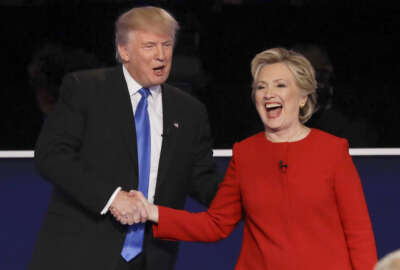
Hatch Act trending thanks to latest election twist
Amid a sudden surge of interest, the Office of Personnel Management has given federal employees a refresher on what they can and cannot do under the Hatch Act.
The Hatch Act is trending, and it’s no mystery why.
Less than a week from Election Day, FBI Director James Comey has been accused of violating the Hatch Act and raising the stakes of an already contentious election.
On Oct. 30, Senate Minority Leader Harry Reid (D-Nev.) accused Comey of violating the Hatch Act after informing Congress that the FBI, in light of new evidence, was reopening an investigation into Democratic presidential nominee Hillary Clinton’s private email server.
In a letter dated Oct. 30, Reid said Comey’s actions could have an undue influence on the outcome of the presidential election on Nov. 8.
“I am writing to inform you that my office has determined that these actions may violate the Hatch Act, which bars FBI officials from using their official authority to influence an election. Through your partisan actions, you may have broken the law,” Reid said.
Since then, Google searches for “Hatch Act” have skyrocketed. While searches for the law spike every October, Google Trend data shows that the term “Hatch Act” has been searched more in the past month than it has ever been searched since 2004.
In light of the last-minute October surprise, the Office of Personnel Management has tweeted out a video primer of what federal employees can and cannot do under the Hatch Act.
The Hatch Act applies to all executive branch employees with the exception of the president and vice president. While those in federal law enforcement and the intelligence community are subject to further regulations, the majority of feds have to comply with the following provisions under the Hatch Act:
- Federal employees are prohibited from using their official authority to interfere with the results of an election.
- Federal employees may not solicit, accept or receive political contributions.
- Federal employees are prohibited from being candidates in partisan elections.
- Federal employees may not encourage or discourage the political activity of anyone with business before their employing agency.
- Federal employees are prohibited from engaging in political activity on-duty or in the federal workplace, while wearing an official uniform or insignia, or using a government vehicle.
If you're a #Fed, please know the restrictions of political activity under the #HatchAct https://t.co/lNbOTl69yn
— OPM (@USOPM) November 3, 2016
Copyright © 2024 Federal News Network. All rights reserved. This website is not intended for users located within the European Economic Area.
Jory Heckman is a reporter at Federal News Network covering U.S. Postal Service, IRS, big data and technology issues.
Follow @jheckmanWFED




